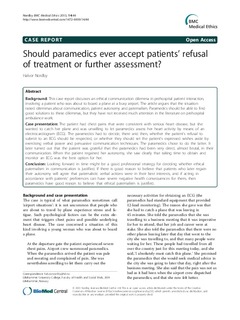Should paramedics ever accept patients’ refusal of treatment or further assessment?
Journal article, Peer reviewed
Permanent lenke
http://hdl.handle.net/11250/278398Utgivelsesdato
2013Metadata
Vis full innførselSamlinger
Originalversjon
Nordby, H. Should paramedics ever accept patients’ refusal of treatment or further assessment?. BMC Med Ethics 14, 44 (2013). doi:10.1186/1472-6939-14-44Sammendrag
Background: This case report discusses an ethical communication dilemma in prehospital patient interaction, involving a patient who was about to board a plane at a busy airport. The article argues that the situation raised dilemmas about communication, patient autonomy and paternalism. Paramedics should be able to find good solutions to these dilemmas, but they have not received much attention in the literature on prehospital ambulance work.
Case presentation: The patient had chest pains that were consistent with serious heart disease, but she wanted to catch her plane and was unwilling to let paramedics assess her heart activity by means of an electrocardiogram (ECG). The paramedics had to decide, there and then, whether the patient’s refusal to submit to an ECG should be respected, or whether they should set the patient’s expressed wishes aside by exercising verbal power and persuasive communication techniques. The paramedics chose to do the latter. It later turned out that the patient was grateful that the paramedics had been very direct, almost brutal, in their communication. When the patient regained her autonomy, she saw clearly that taking time to obtain and monitor an ECG was the best option for her.
Conclusion: Looking forward in time might be a good professional strategy for deciding whether ethical paternalism in communication is justified. If there is good reason to believe that patients who later regain their autonomy will agree that paternalistic verbal actions were in their best interests, and if acting in accordance with patients’ preferences can have severe negative health consequences for them, then
paramedics have good reason to believe that ethical paternalism is justified.
